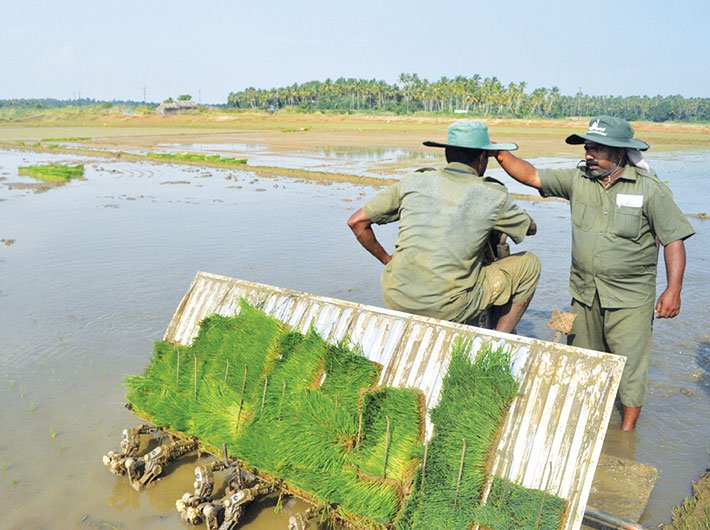Labour banks have come as a boon for farmers in Thrissur and nearby districts of Kerala. With the panchayat taking pro-active steps, farming returns as an attractive and productive occupation
Acres of emerald sparkle in knee-deep water in the paddy kohl fields in Thrissur, Kerala. It is sunny and transplanting is going on. There are hardly any workers to be seen for all the work that is happening. But if one looks carefully, a tiny trolley-like equipment is moving in some patches of the fields. There is a person in a smart uniform manoeuvring it and another in a green uniform busy adjusting what seems like a rectangular bunch of young paddy saplings at the back of the engine, as they drop on their own into the trenches made by it.
In minutes a whole patch has been paddy-transplanted. Some 18 transplanters (as the machines are called) are at work to replant paddy in about 400 acres of land.
In an adjacent patch, there is a long rectangular carpet of young paddy saplings growing close to one another. The drivers on the transplanters tear off a piece of the carpet and fix it to their wheeled machine, transplanting it in the next patch.
The paddy saplings had been planted on a carpet of mud with another machine. These machines and the workers, all belong to a labour bank in the Vadakkancheri panchayat of the district. It is a unique bank of skilled labour, pioneered a decade ago, and is now part of a pilot project in the state along with two other districts.
Anoop Kishore, founder of the labour bank, was then the panchayat president. A young man then, Kishore was impatient with anything that didn’t work well and was enthusiastic about cooperative movements. He turned the Peringandoor Service Cooperative Bank (of which he is currently the president) into a huge success and today the bank also runs a shopping mall from its profits. Kishore decided to try cooperatives in a different area: skilled farm labour and farm equipment. So he mooted the idea of a labour bank in the panchayat to carry out group farming in the 400 acres of paddy fields.
The panchayat formed an ngo called ‘Green Army’, and in association with the Kerala Agricultural University, it trained some workers for 24 days. The panchayat itself became the implementing agency and used the NGO to carry out farming in paddy collectives under it. “We were taking NREGS (National Rural Employment Guarantee Scheme) to the next level,” says Kishore. Labourers, who had worked more than once under NREGS, were selected for training and farmwork. The block panchayat funded the training, and the 300-odd workers who comprised the first-ever skilled labour bank in the country, were then deployed to paddy group farming collectives that the panchayat had identified.
Winning the panchayat elections in November, Kishore has been named deputy president of the municipality of Vadakkancherry. He is filled with pride as he talks about the origins of the bank. “It is the first-ever skilled labour bank.” The nine panchayats in the Vadakkancherry block had 120 paddy collectives comprising 4,559 hectares of land.
Soon Maitri, an NGO in Palakkad district, joined hands with Green Army farmers’ bank and started mapping farm collectives there. They made a farm calendar and an irrigation calendar as well. “So as per the calendars, the paddy collective in-charge would know when to get workers or machines from the labour bank,” says Kishore. So it was a revival of not just paddy farming but also an educational process, as agriculture itself had been all but dead in the state.
The next big development was that Thrissur district itself, along with the adjoining districts – Palakkad and Malappuram – decided to form a consortium, says Kishore. Each block in every district was to have a manpower bank along with a bank of mechanised farming equipment. In all, there were 43 blocks. The workers were guaranteed at least 40 days’ labour under NREGS, Kishore adds. About 100 people are trained in a panchayat and up to 250 in a block. The bank in Vadakkancherry keeps its equipment in a huge garage. It has 67 transplanters – the tiny robot-like machines that were seen crawling up and down the paddy fields - three harvesters, several weeders and bailers (to bind hay).
The workers are all uniformed giving farming a total makeover. The work is on for 150 days a year that starts in July and ends in January. Since only a single crop of paddy is being taken care of now, the days are limited. Kishore rules out expansion to multiple crops or multiple sowing as that would ask for additional storage and infrastructure needs. He, however, sees a day not in the distant future when farmers may get wages for 300 days a year through the bank.
The wages
Currently wages are paid on per-acre basis. The paddy collective, a group of land owners who have agreed to pool their patches under a common leadership, pay a certain amount to the farm bank for cultivation. The collective pays a certain amount to the labour bank for cultivation of crops. The bank in turn pays the workers. If they work 16 days a month, they get paid a monthly salary. The group leader gets about Rs 12,000 a month while others get between Rs 10,000 and Rs 15,000, besides a snazzy profile of a uniformed worker.
The high literacy rate of Kerala was becoming a burden for its farmlands with no one willing to do any manual work. But Green Army in Vadakkancherry and its replications elsewhere in other blocks may be turning over a new leaf in the history of agriculture in the state.
Kishore says that workers in his bank and in other two districts are only Keralites. “So far, we have kept out migrants. We have enough workers in the state who are willing to take up this work,” he says. What he offers other workers is training. Green Army and Maitri have been conducting workshops for panchayats from other states. “If they can replicate this model there, fine,” says Kishore, adding that every state has a different problem and a different solution.
Valsa Mathai, a team leader, is busy trying to meet her target of two acres for the day. Thomas, another labourer from the bank, is educated like many others but chose farming than any other work as he was passionate about it. “My father did it and I have loved it since childhood,” he says. He praises the bank as it is helping revive farming. So much of paddy land is lying uncultivated in southern Kerala. If they would all get their farm and equipment banks in place at the block level, then things would start moving.
Twelve teams are at work currently from the Vadakkanchaerry Green Army. They can be seen in their smart green uniforms plying their transplanters or dragging off their paddy carpets. Not far away in some other patches, the labour bank from nearby Cherpu block is working at their paddy patches. Here, workers are uniformed but are all women. There are no men to be seen. Nikhil MS is the coordinator of labour banks in three blocks in Thrissur viz. Cherpu, Mathilakam, Pazhayannur and Puzhakkal. He says, “Though we are following Vadakkancherry panchayat bank as our model, we are a project under the Mahila Kisan Sashaktikaran Pariyojana (MKSP) of the rural development ministry.
So we have no choice but to employ only women NREGA workers. They are not regular, they come at 10 in the morning and leave early.
Farm work can’t happen in that schedule.” Besides, “the politicians do not support us,” he adds. “The panchayat supports only projects where a particular politician has stakes. No one has any stakes in this project and thus it is neglected,” he says, sounding extremely disappointed.
Nikhil feels that though the Palakkad, Thrissur and Malappuram pilot projects that were started in 2014 are doing well, just 20 of the 43 banks can be really said to be effective. “Banks are not doing well in Malappuram and Thrissur as there are issues with the land mafia not letting go the paddy fields, and lands being converted into cash crops or real estate. But in Palakkad where agriculture is still strong, the banks have come as a blessing,” says Kishore.
The government has now agreed to expand the project to three other districts from June 2016: Kannur, Ernakulam and Kozhikode. But Cherpu labour bank has already carried out some projects in Ernakulam in Aluva block. “We planted paddy in 65 acres in Aluva recently. We are open to taking up collectives anywhere. The only hitch is that women should be enterprising enough to work all day or the government should take a fresh look at the potential of the banks and link it to NREGA and not MKSY,” says Nikhil.
Menon is a freelance journalist.
(The story appears in the December 16-31, 2015 issue)

